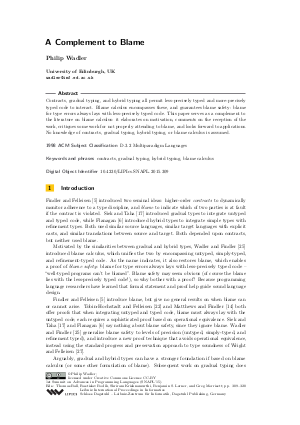A Complement to Blame
Author Philip Wadler
-
Part of:
Volume:
1st Summit on Advances in Programming Languages (SNAPL 2015)
Part of: Series: Leibniz International Proceedings in Informatics (LIPIcs)
Part of: Conference: Summit on Advances in Programming Languages (SNAPL) - License:
 Creative Commons Attribution 3.0 Unported license
Creative Commons Attribution 3.0 Unported license
- Publication Date: 2015-04-30
File

PDF
LIPIcs.SNAPL.2015.309.pdf
- Filesize: 423 kB
- 12 pages
Document Identifiers
Subject Classification
Keywords
- contracts
- gradual typing
- hybrid typing
- blame calculus
Metrics
- Access Statistics
-
Total Accesses (updated on a weekly basis)
0Document
0Metadata
Abstract
Contracts, gradual typing, and hybrid typing all permit less-precisely typed and more-precisely typed code to interact. Blame calculus encompasses these, and guarantees blame safety: blame for type errors always lays with less-precisely typed code. This paper serves as a complement to the literature on blame calculus: it elaborates on motivation, comments on the reception of the work, critiques some work for not properly attending to blame, and looks forward to applications. No knowledge of contracts, gradual typing, hybrid typing, or blame calculus is assumed.
Cite As Get BibTex
Philip Wadler. A Complement to Blame. In 1st Summit on Advances in Programming Languages (SNAPL 2015). Leibniz International Proceedings in Informatics (LIPIcs), Volume 32, pp. 309-320, Schloss Dagstuhl – Leibniz-Zentrum für Informatik (2015)
https://doi.org/10.4230/LIPIcs.SNAPL.2015.309
BibTex
@InProceedings{wadler:LIPIcs.SNAPL.2015.309,
author = {Wadler, Philip},
title = {{A Complement to Blame}},
booktitle = {1st Summit on Advances in Programming Languages (SNAPL 2015)},
pages = {309--320},
series = {Leibniz International Proceedings in Informatics (LIPIcs)},
ISBN = {978-3-939897-80-4},
ISSN = {1868-8969},
year = {2015},
volume = {32},
editor = {Ball, Thomas and Bodík, Rastislav and Krishnamurthi, Shriram and Lerner, Benjamin S. and Morriset, Greg},
publisher = {Schloss Dagstuhl -- Leibniz-Zentrum f{\"u}r Informatik},
address = {Dagstuhl, Germany},
URL = {https://drops.dagstuhl.de/entities/document/10.4230/LIPIcs.SNAPL.2015.309},
URN = {urn:nbn:de:0030-drops-50333},
doi = {10.4230/LIPIcs.SNAPL.2015.309},
annote = {Keywords: contracts, gradual typing, hybrid typing, blame calculus}
}
Author Details
References
-
Amal Ahmed, Robert Bruce Findler, Jeremy G. Siek, and Philip Wadler. Blame for all. In Principles of Programming Languages (POPL), pages 201-214, 2011.

-
Andrej Bauer and Matija Pretnar. An effect system for algebraic effects and handlers. Logical Methods in Computer Science, 10(4), 2014.

-
Gavin Bierman, Erik Meijer, and Mads Torgersen. Adding dynamic types to C#. In European Conference on Object-Oriented Programming, ECOOP'10. Springer-Verlag, 2010.

-
Ezra Cooper, Sam Lindley, Philip Wadler, and Jeremy Yallop. Links: Web programming without tiers. In Formal Methods for Components and Objects, pages 266-296. Springer, 2007.

-
Robert Bruce Findler and Matthias Felleisen. Contracts for higher-order functions. In International Conference on Functional Programming (ICFP), pages 48-59, October 2002.

-
Cormac Flanagan. Hybrid type checking. In Principles of Programming Languages (POPL), January 2006.

-
Michael Greenberg, Benjamin C. Pierce, and Stephanie Weirich. Contracts made manifest. In Principles of Programming Languages (POPL), 2010.

-
Jessica Gronski and Cormac Flanagan. Unifying hybrid types and contracts. In Trends in Functional Programming (TFP), April 2007.

-
Robert Harper. Practical foundations for programming languages. Cambridge University Press, 2012.

-
Anders Hejlsberg. Introducing TypeScript. Microsoft Channel 9 Blog, October 2012.

-
Fritz Henglein. Dynamic typing: Syntax and proof theory. Science of Computer Programming, 22(3):197-230, 1994.

-
David Herman, Aaron Tomb, and Cormac Flanagan. Space-efficient gradual typing. Higher-Order and Symbolic Computation, 23:167-189, 2010.

-
Daan Leijen. Koka: Programming with row polymorphic effect types. In Mathematically Structured Functional Programming (MSFP), pages 100-126, 2014.

-
Jacob Matthews and Robert Bruce Findler. Operational semantics for multi-language programs. In Principles of Programming Languages (POPL), pages 3-10, January 2007.

-
John Reynolds. Types, abstraction, and parametric polymorphism. In R. E. A. Mason, editor, Information Processing, pages 513-523. North-Holland, 1983.

-
Jeremy Siek, Peter Thiemann, and Philip Wadler. Blame and coercions: Together again for the first time. Technical report, University of Edinburgh, 2014.

-
Jeremy G. Siek and Walid Taha. Gradual typing for functional languages. In Scheme and Functional Programming Workshop (Scheme), pages 81-92, September 2006.

-
Jeremy G. Siek and Philip Wadler. Threesomes, with and without blame. In Principles of Programming Languages (POPL), pages 365-376, 2010.

-
Richard Statman. A local translation of untyped [lambda] calculus into simply typed [lambda] calculus. Technical report, Carnegie-Mellon University, 1991.

-
Nikhil Swamy, Juan Chen, Cédric Fournet, Pierre-Yves Strub, Karthikeyan Bhargavan, and Jean Yang. Secure distributed programming with value-dependent types. In International Conference on Functional Programming (ICFP), September 2011.

-
Nikhil Swamy, Cedric Fournet, Aseem Rastogi, Karthikeyan Bhargavan, Juan Chen, Pierre-Yves Strub, and Gavin Bierman. Gradual typing embedded securely in javascript. In Principles of Programming Languages (POPL), January 2014.

-
Sam Tobin-Hochstadt and Matthias Felleisen. Interlanguage migration: From scripts to programs. In Dynamic Languages Symposium (DLS), pages 964-974, October 2006.

-
Philip Wadler. Theorems for free. In Functional Programming Languages and Computer Architecture (FPCA), September 1989.

-
Philip Wadler. Comprehending monads. Mathemetical Structures in Computer Science, 2(4):461-493, 1992.

-
Philip Wadler and Robert Bruce Findler. Well-typed programs can't be blamed. In European Symposium on Programming (ESOP), pages 1-16, March 2009.

-
Alfred North Whitehead. An Introduction to Mathematics. Henry Holt and Company, 1911.

-
Andrew K. Wright and Matthias Felleisen. A syntactic approach to type soundness. Information and Computation, 115(1):38-94, 1994.

- Boris Yankov. Definitely typed repository, 2013. URL: https://github.com/borisyankov/DefinitelyTyped.
